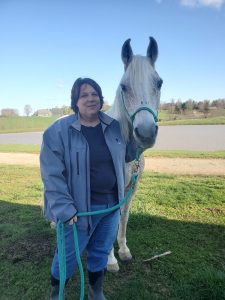Scecina’s counselor’s passion for horses leads to work in equine-assisted therapy

Patty Hagen
By Beth Murphy, Director of Marketing Communications
Patty Hagen is drawn to helping young people in both her day job as a high school guidance counselor and in her years of experience working with equine (horse) therapies for youths.
“I guess it is satisfying to me because I strongly believe I have been ‘called’ to help children however I can,” said Hagen, who is Scecina’s director of counseling.
“I believe I am being the hands of Christ when I am trying to help people.”
Earlier this year, Hagen was named to the board of Ben’s Ranch Foundation, where she had been volunteering and working part time. Ben’s Ranch Foundation finds internships on farms for teenagers who have been dealing with a wide spectrum of mental health issues, from anxiety to a diagnosed mental illness such as bipolar disorder, and even schizophrenia.
Patty Hagen explains how equine-assisted therapy helps children and adolescents
As a young equestrian, Hagen realized how horses could be used in therapy for people. At the time, she was dealing with a jumpy, agitated horse.
“He was even kicking and bucking when I would guide the reins toward the left rail or turned him to the left,” she said. “He was very quick to jump when something moved on his left. We believed he had been beaten.”
She and the horse had to learn to trust one another.
“In working with him and getting him ready to show in an arena, our relationship had to start with the foundation of any relationship — trust — which neither of us had for one another after I had been thrown a few times,” she said.
“We developed the perfect therapist-client relationship, and we were both better for it.”
She was intrigued when she later heard about how horses were being used with trauma victims to aid in recovery, and to help addicts and those with eating disorders heal and change.
“I could already understand how powerful it can be,” she said.
Hagen’s parents owned a cattle farm and horse ranch in Kentucky and Missouri.
“This is how I became a ‘country girl wanna-be.’ I grew up riding and showing horses and loved spending time at the riding stables and at our farm in Kentucky riding horses in open spaces,” she said.
Hagen has a bachelor of business administration from Saint Mary’s College, Notre Dame; a master of education from Ball State University; and a master of science in school counseling from Butler University.
When she arrived Central Indiana in 1988, she began volunteering with Agape Therapeutic Riding Center in Cicero. At that time, Agape was solely therapeutic riding using a methodology called hippotherapy. It allows riders who perhaps do not have muscular control or have weak muscles to use the horse to help them move.
“Many people do not recognize the difference between therapeutic riding and equine-assisted therapy,” Hagen said. “They are two very different therapies though. I enjoy aiding in both types of therapies.”
In the 1990s, hippotherapy was becoming a popular therapy for those with developmental delays, cognitive disabilities, and physical disorders that affected the ability to learn and move, she said.
Using horses with people facing addictions and mental illnesses, such as eating disorders, was less common, although it was being used increasingly at inpatient facilities across the country where horses were prevalent. “It is this work that has always intrigued me since my own riding days,” Hagen said.
Hagen eventually became an equine specialist providing Equine Assisted Growth and Learning (EAGALA), a method of providing equine-assisted psychotherapy that gives people an alternative to traditional talk therapy. An equine specialist and mental health professional work as team to help the client. EAGALA uses the client’s experience with the horses to drive change.
She then began volunteering and eventually working part time at Ben’s Ranch Foundation, whose mission is “to create new options and new hope for young people struggling with mental health challenges, by connecting them to employment opportunities on farms, ranches, stables, and therapeutic riding facilities,” according to its website.
Many of the Ben’s Ranch paid internships are on farms that provide equine-assisted riding therapy, or private riding lessons, or raise cattle or sheep, Hagen said.
Studies have found that when people, those suffering from PTSD in particular, work with livestock or vegetation as in farm life, their senses are awakened, they gain confidence in themselves, are occupied with things outside of a world of technology, stress and pressures, and form real relationships with people focusing on a common purpose of taking care of animals and the land, Hagen said.
“Many people find a place where they can manage their mental health challenges and focus on positive change that happens very naturally,” Hagen said.
